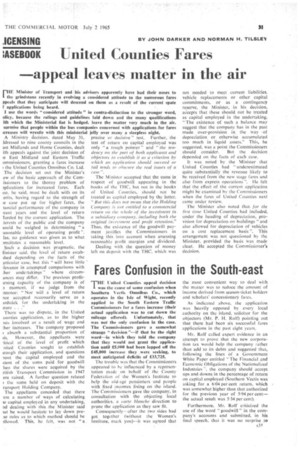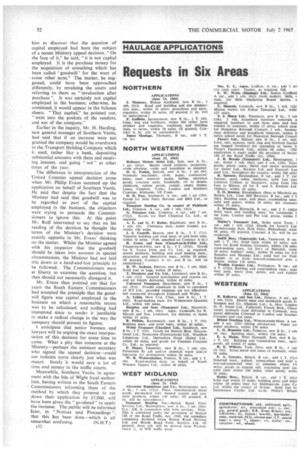Fares Confusion in the South-east
Page 33

Page 34

If you've noticed an error in this article please click here to report it so we can fix it.
THE United Counties appeal decision I. was the cause of some confusion when Southern ectis Omnibus Co., which operates in the Isle of Wight, recently applied to the South Eastern Traffic Commissioners for a fares increase (their actual application was to cut down the mileage offered). Unfortunately, that was not the only confusion in the case. The Commissioners gave a somewhat strange 'decision "—if that be the right word—in which they told the company that they would not grant the application until £5,000 had been lopped off the £45,000 increase they , were seeking, to meet anticipated deficits of £33,725.
The trouble was that the Commissioners appeared to he influenced by a representation made on behalf of the County Federation of the Women's Institute to help the old-age pensioners and people with fixed incomes living on the island. The Commissioners gave the company, in consultation with the objecting local authorities, a carte blanche direction to prune the application as they saw fit.
Consequently—after the two sides ha.d got together (without the Women's Institute, mark you)—it was agreed that the most convenient way to deal with the matter was to reduce the amount of income derived from season-ticket holders and scholars' concessionary fares.
As indicated above, the application was heavily opposed by every local authority on the island, solicitor for the objectors (Mr. P. H. Rolf) pointing out that there had been six successful fares applications in the past eight years.
Mr. Rolf called expert evidence in an attempt to prove that the new corporation tax would help the company rather than add to its debts and suggested that, following the lines Of a Government White Paper entitled "The Financial and Economic Obligations of the Nationalized Industries", the company should accept ups and downs in the percentage of return on capital employed (Southern Vectis was asking for a 6.04 per cent return, which was somewhat higher than that authorized for the previous year of 5.94 per cent— the actual result was 534 per cent).
Furthermore, Mr. Rolf criticized the use of the word " goodwill " in the cernpany's accounts and submitted, in his final speech, that it was no surprise to him to discover that the question of capital employed had been the subject of a recent Ministry appeal decision. "On the face of it," he said, "it is not capital employed. It is the purchase money for the acquisition of something which has been called ' goodwill' for the want of some other term." The matter, he suggested, could have been approached differently, by revaluing the assets and referring to them as "revaluation after purchase ". It was certainly not capital employed in the business; otherwise, he continued, it would appear in the balance sheets. "That capital," he pointed out, went into the pockets of the vendors, and not of the company."
Earlier in the inquiry, Mr. H. Harding, new general manager of Southern Vectis, had said that if an increase were not granted the company would be overdrawn to the Transport Holding Company which it used, rather like a bank, depositing substantial amounts with them and receiving interest, and going " red " at other times of the year.
The difference in interpretation of the United Counties appeal decision arose when Mr. Philip Evans summed up the application on behalf of Southern Vectis. He said that despite the fact that the Minister had said that goodwill was to be regarded as part of the capital employed in the business, the objectors were trying to persuade the Commissioners to ignore this. At this point Mr. Rolf intervened to say that on his reading of the decision he thought the terms of the Minister's decision were exactly opposite to Mr. Evans' thinking on the matter. Whilst the Minister agreed, with his inspector that the goodwill should be taken into account in special circumstances, the Minister had not laid this down as a hard-and-fast principle to be followed. The Commissioners were at liberty to examine the question, but then should not necessarily disregard it. Mr. Evans then pointed out that for -wears the South Eastern Commissioners had accepted the principle that the goodwill figure was capital employed in the business on which a reasonable return was to be calculated, and nothing had transpired since to render it justifiable to make a radical change in the way the company should present its figures.
I anticipate that senior busmen. and lawyers will be arguing the exact interpretation of this decision for some time to come. What a pity that someone at the Ministry—perhaps the assistant secretary who signed the appeal decision—could not indicate more clearly just what was meant. Surely it would save a lot of time and money in the traffic courts.
Meanwhile, Southern Vectis, in agreement with the Isle of Wight local authorities, having written to the South Eastern Commissioners informing them of the method by which they propose to cut down their application by £5,000, will have been given the "go-ahead" to apply the increase. The public will be informed later, in "Notices and Proceedings ". that this has been done—which is all
somewhat confusing. (N.H.T.)
























































































































